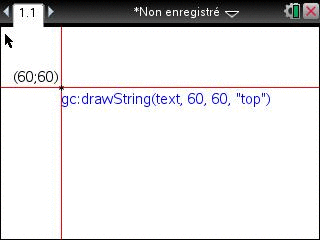Difference between revisions of "gc:drawString"
Jump to navigation
Jump to search
(→Syntax) |
|||
| Line 24: | Line 24: | ||
| <u><center>position</center></u> || string || the string’s anchor point. It can either be "baseline", “bottom”, “middle”, or “top”. See screenshot below. | | <u><center>position</center></u> || string || the string’s anchor point. It can either be "baseline", “bottom”, “middle”, or “top”. See screenshot below. | ||
|} | |} | ||
| + | |||
| + | The ''position'' argument is optional, but defaults to "bottom" as of OS 3.2. | ||
| + | |||
== Example == | == Example == | ||
<syntaxhighlight>function on.paint(gc) | <syntaxhighlight>function on.paint(gc) | ||
Revision as of 14:33, 18 June 2012
drawString is a function that is part of gc (Graphics Context).
This function is used to display text, numbers etc. on the screen at specified coordinates.
Returns an integer corresponding to the width of the displayed string.
This has been introduced in TI-Nspire OS 3.0 (Changes).
Syntax
gc:drawString(string, x, y [,position])
| Parameter | Type | Description |
|---|---|---|
| string | The text to display | |
| number | the x coordinate of the beginning of the string. Relative to position. | |
| number | the y coordinate of the beginning of the string. Relative to position. | |
| string | the string’s anchor point. It can either be "baseline", “bottom”, “middle”, or “top”. See screenshot below. |
The position argument is optional, but defaults to "bottom" as of OS 3.2.
Example
function on.paint(gc)
gc:drawString("Hello World", 0, 0, "top")
endwill display Hello World at the top-left part of the screen.
Good to know
In order to clear up what 'position' does, here's an animated image with the 4 possibilities, showing a text that is drawn at the same 60;60 coordinates, but with different "position" attributes.
